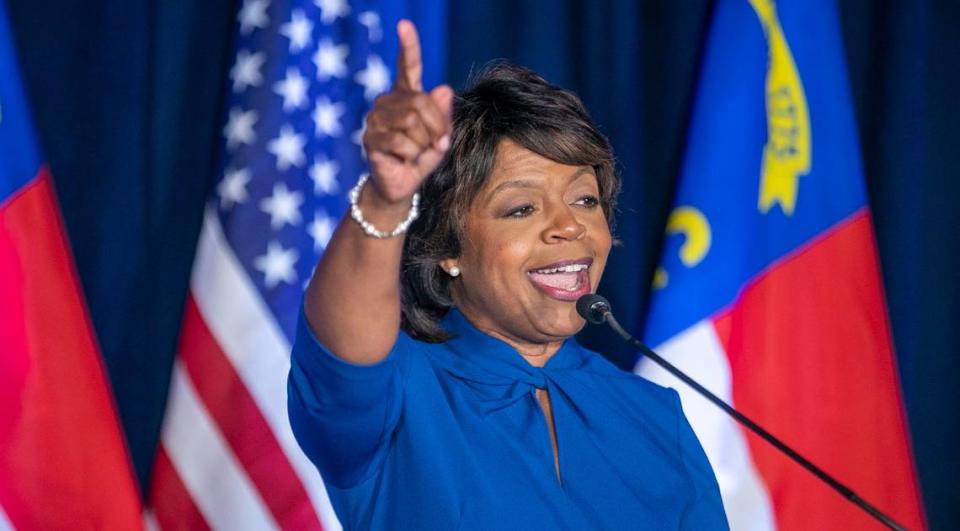North Carolina election could determine who controls U.S. Senate
North Carolina voters are poised in November to help break the tie between the country’s two political parties battling for control of the U.S. Senate.
One Democrat and six Republican senators, including North Carolina’s Richard Burr, have announced their retirements at the end of 2022. Another 15 Republicans and 13 Democrats are up for reelection.
That leaves voters deciding whether to replace Burr with another Republican or a Democrat in a battleground state that Inside Elections considers to lean Republican.
The battle for the U.S. Senate in North Carolina is expected to be caustic and costly.
Since December, former N.C. Supreme Court Chief Justice Cheri Beasley was considered the presumptive nominee of the Democratic Party. Voters solidified her nomination Tuesday in North Carolina’s primary.

She will face Republican nominee Rep. Ted Budd who, with the endorsement of former President Donald Trump and a multimillion-dollar investment from the Club for Growth, an influential conservative organization, was able to stave off his fellow Republicans and secure the GOP nomination.
The attacks on began immediately.
The stakes
Democrats in North Carolina are hungry for a senator to represent their interests in the upper chamber.
The party hasn’t been able to send a representative to the U.S. Senate since the election of Kay Hagan in 2008.
“What’s at stake is potentially control of the United States Senate and potentially determining whether North Carolina moves farther into Democratic territory,” said Chris Cooper, a political science professor at Western Carolina University.
Beasley’s election would make her the only Black woman in the Senate and just the 12th Black senator in history.
“Representation matters and diversity matters,” Beasley said. “I will never forget the time I saw an African American woman presiding and I was a practicing lawyer at the time and it was life changing for me.”
But she added that she wants to be clear that her election means she will represent all North Carolinians.
Early in the primary season Beasley faced challengers in state Sen. Jeff Jackson and former state Sen. Erica Smith. They left the race by mid-December saying they wanted to spare the party from a costly primary and that Democrats needed to unite behind Beasley.
Their decisions seemed to solidify the party’s understanding of what was at stake. And that messaging worked.
Beasley launched a campaign that allowed her to go out, meet voters, avoid slinging mud at competitors and collect money without having to spend it on defense as Budd did.
Beasley currently has nearly $3.3 million on hand compared to Budd’s $1.1 million.
But a Politico article Friday morning surprised even Cooper when it reported that neither the Democratic Senatorial Campaign Committee nor the Senate Majority PAC have committed financing to Beasley’s campaign.
“I think that is potentially the death knell for her campaign,” Cooper said, “and also could spell catastrophe for the Democrats in general in North Carolina. She needs that money and the Democratic Party needs that money.”

Wrong for you
The primary hadn’t even concluded when the National Republican Senatorial Campaign invested $1.3 million in an attack ad accusing Beasley of being soft on crime. The Democratic Party immediately launched a “Ted Budd’s not for North Carolina” campaign, playing off the Budweiser “This Bud’s for You” ad campaign.
Sen. Thom Tillis warned voters that Beasley would be a rubber stamp for President Joe Biden and Senate Majority Leader Chuck Schumer. N.C. Democratic Party Chairwoman Bobbie Richardson warned that Budd was “a Washington insider” who puts his interests above his constituents’.
Jonathan Felts, campaign adviser for Budd, told The News & Observer Thursday he thinks the race will be competitive and both sides will offer robust messages.
“I think the reason Ted won so overwhelmingly on Primary night is he’s a different kind of politician,” Budd said. “And he’s very authentic. He doesn’t shy away from what he believes in and he’s not going to start shying away from what he believes in. He’s a conservative fighter, he’s a small businessman and he’s fighting for the America First agenda.”
Beasley told the N&O Wednesday that she knows the race is going to be tough but she’s ready for it and she’s proven her naysayers wrong before.
“This is not about partisan games for us, and people’s lives are not political footballs,” Beasley said. “They want to know that the next senator is going to fight hard for them and work towards the issues that help save people’s lives.
Jason Husser, a political science and policy studies professor at Elon University, said how the economy and the war in Ukraine play out between now and November will determine a lot about the general election.
“If we’re still seeing $4.25 gas prices and Republicans are able to make that the top agenda item and they’re able to sufficiently say Biden was to blame for it, that doesn’t bode well for Beasley,” Husser said. “If the Democratic Party, nationally, can frame the election around a non-economic issue, say for instance women’s rights, then perhaps they’ll be better off.”

 Yahoo Movies
Yahoo Movies 
